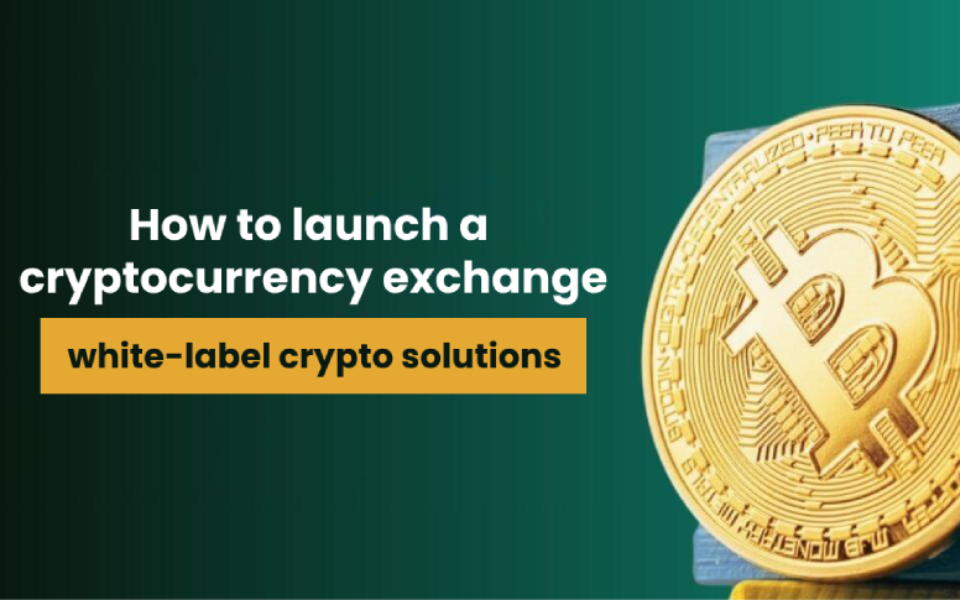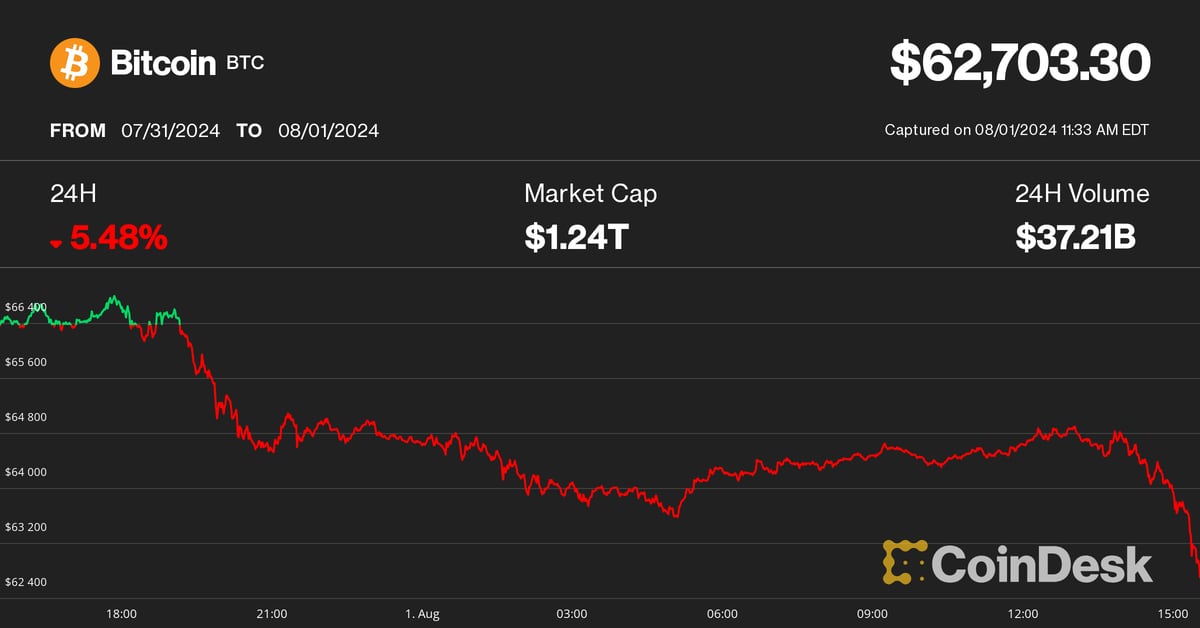Blockchain
How to Launch a Cryptocurrency Exchange Using White-Label Cryptocurrency Solutions | nasscom

Cryptocurrency has emerged as a new asset class, especially in light of its rapid spike in value earlier this year. For the first time, the total value of the cryptocurrency market has surpassed $2 trillion.
The cryptocurrency realm is becoming increasingly popular as more and more people see it as an investment opportunity. Increased traffic and the rise of NFTs as a new source of income have increased the demand for reliable cryptocurrency trading software. This demand has driven the establishment of more cryptocurrency exchanges. There is always a demand for reliable cryptocurrency trading software, so many companies want to create and establish their own.
Usually, it takes a lot of time, effort, and money to develop a cryptocurrency exchange software. A creative strategy was needed to overcome this obstacle, and this difficulty led to the creation of a white-label cryptocurrency exchange. White-label exchange solutions offer various advantages over traditional cryptocurrency exchange software. As a result, companies are already investing in the development of a white-label cryptocurrency exchange. So, this blog will describe the hidden corners of white-label cryptocurrency exchange and its importance. Let’s get straight to the topic…
Cryptocurrency exchange and its types
A cryptocurrency exchange is a platform that allows users to buy/sell or trade various cryptocurrencies. It is similar to a stock market, but instead of stocks, users can buy or sell cryptocurrencies. The exchange platform allows traders to conduct fiat-to-cryptocurrency and cryptocurrency-to-cryptocurrency transactions.
Cryptocurrency exchanges are roughly grouped into three types based on the nature of their operations. They do,
- Centralized Exchange (CEX)
This cryptocurrency exchange platform will be managed by a centralized entity, like a single organization. This exchange will have complete control over all the transactions that happen on the platform. For example, Binance is one of the centralized exchange platforms.
- Decentralized Exchange (DEX)
As the name suggests, this type of cryptocurrency exchange is an alternative to centralized exchanges. Transactions are handled by automated processes rather than centralized controls in this case. A DEX has no central authority and operates on a peer-to-peer model. Binance DEX, for example, is a decentralized exchange developed by Binance that is completely autonomous.
This type of cryptocurrency exchange combines the merits of both centralized and decentralized exchanges. It offers the low latency and fast transaction speeds of centralized platforms, but lacks the central figure of decentralized exchanges. It improves the security of your information. The increase in cryptocurrency users has increased the number of cryptocurrency platforms. Many companies have launched cryptocurrency exchange platforms. TRON Joyso, Joyso is a great example of a hybrid exchange.
How do you get started with a cryptocurrency exchange?
Cryptocurrency trading is mostly done online because the core of the business is the exchange of digital assets. The software used, as with any internet platform, is a sign of its potential. The more adaptable, secure and adjustable the software is, the easier it will be to run your business.
Building software is difficult, and building a cryptocurrency exchange is no exception. Also, unlike most software products on the market, software products that use cryptocurrency and blockchain technology are very new, with little precedent. Also, public blockchain technology is a young topic that has only been around for a decade. The Internet, on the other hand, has been around for nearly forty years.
Before we get into the creative part, let’s take a look at the two main styles of software development.
- Developing a cryptocurrency exchange from scratch.
- Using a White-Label Cryptocurrency Exchange.
In the first situation, creating a new cryptocurrency exchange is a time-consuming and resource-intensive endeavor. It requires a tremendous amount of money, time, equipment, and energy to build a platform from scratch. Not to mention, the level of technical expertise required to pull it off would be too much for a single person or even a small institution. Finding the right people for the job would also be difficult.
A white label cryptocurrency exchange software, on the other hand, is a ready-made and fully customizable software that can be purchased and installed. This software includes all the basic trading and security features needed to run a cryptocurrency exchange. You can also customize it further and add unique modifications that you think will suit your business needs.
White label cryptocurrency exchange
White label exchange is a better option than typical cryptocurrency exchange software development. For starters, developing white label cryptocurrency exchange software requires less time and money. Also, a company can launch its exchange platform in much less time. These platforms can meet additional standards and run on any network. Before releasing the product on the preferred blockchain, white label exchange software developers test it numerous times.
How to start a cryptocurrency exchange using a white-label solution?
To start a cryptocurrency exchange with a White-Label solution, you must first understand the advantages and disadvantages of having a White-Label cryptocurrency exchange.
Advantages
- A white-label cryptocurrency exchange eliminates the additional time, development, and effort required to build an exchange from scratch.
- It can be customized according to your specifications.
- It offers a higher return on investment (ROI).
- It allows you to create a ready-to-use trading platform in minutes.
Disadvantages
- To buy white-label cryptocurrency exchange, you will need short-term funds.
- Since this is a ready-made solution, it is difficult to customize it in depth.
Once you choose a software provider, you will be able to set up your own white-label cryptocurrency exchange in just a few weeks. The provider will provide all the security features and customer support. This means you can focus on more important things rather than the headache of designing and running your cryptocurrency exchange.
Benefits of Using a White-Label Cryptocurrency Exchange
Let’s take a look at the many benefits of using white-label solutions when developing bitcoin exchanges. For starters, it eliminates the need for endless hours of software development and saves money. White-labeling allows businesses to focus on only the core elements, allowing them to spend more time managing and growing their operations.
The best benefit of a white-label solution is the security it provides. White-label cryptocurrency exchanges provide anti-phishing features, two-factor authentication, and superior data encryption. These platforms can be implemented in a matter of days.
Creating a White-Label Cryptocurrency Exchange
Below are some of the key steps involved in developing a white-label cryptocurrency exchange:
Why is White Label Crypto Exchange Software Better?
Entrepreneurs who want to start a new business, any new business, will do so based on their idea and skill set. A cryptocurrency exchange business requires a unique blend of talents, knowledge, and vision. And that is where the following factors come into play to show you why White label cryptocurrency exchange software is the best option.
Analysis: Building a cryptocurrency exchange platform from the bottom up is a tough task. Market research is a must. You will need to do a lot of research on the type of platform you want to design. Order Book models, AMM models, P2P models, OTC models, aggregator models, and so on. You need to understand the subtle differences between them and also how to code the methods. When it comes to cryptocurrency exchange scripts, however, you can select the type of platform you want and get that specific product. The developer will automatically install whatever features and functions you require in the cryptocurrency exchange platform.
Technical Expertise: The quality of any cryptocurrency exchange platform is ultimately determined by the technical specialists who assisted in its design. Blockchain technology includes layer 1 blockchains, layer 2 blockchains, interoperability, decentralized apps, smart contract creation, and security subsystems. All of this requires specialized experts who work around the clock to design each individual software module before carefully stitching them together to make them work effortlessly. The technical knowledge required to build a cryptocurrency exchange platform from the ground up is a nightmare. A white-label bitcoin exchange software, on the other hand, is a pre-tested, ready-to-use software solution.
Security: Creating security mechanisms for an online platform is an art form, a challenging task because it involves both the user and the administrator. HTTPS authentication, jail access, two-factor authentication, ADoS, ADDoS, data encryption and more… A platform requires all these features and creating each of these as independent modules and then integrating them will take months of work, not to mention stress testing. While with white-label cryptocurrency exchange software, all these critical security protections are integrated as part of the offering.
Customizations: Before using a software for business purposes, you need to customize it a little. Customization can be difficult when developing a cryptocurrency exchange platform from scratch. Although it is not a daunting task, it is time-consuming. A white-label cryptocurrency exchange software is purchased from a developer who has all the necessary tools and experience. So, you can have it tailored exactly to your specifications before purchasing it from them. It is an excellent approach to saving time.
User-friendly – As a developer, it can be difficult to imagine a user-friendly platform during development. When new online platforms are released, they are never user-friendly; however, as more users use and review them, they become easier to use. This is a normal part of the process during the first launch. This is not an issue with white-label products, which are often built after established web platforms and therefore are often user-friendly from the start.
Add-ons: Another major hurdle for developers is the availability of additional features. Once the product is released, adding new features is a major undertaking that must be completed with each update period. It must be developed first, so the program must be closed to the public for a while before being updated. However, adding new features to the white-label cryptocurrency exchange software is a fairly simple task. Since the add-on has already been built and tested, an update can be booked within a few hours.
Final words
A business is the ultimate ambition of every entrepreneur. With cryptocurrency being the best performing asset in the last decade, it is natural that entrepreneurs want to invest their ideas, time and money in the cryptocurrency market. However, investing is not the same as setting up a cryptocurrency exchange and a white label cryptocurrency exchange script It is one of the best ways to get started as soon as possible.
Blockchain
Bitcoin (BTC) Price Crashes as Donald Trump’s Win Odds Dip

Markets received nominally good news on Thursday morning, with the US ISM manufacturing PMI for July falling much more than economists expected, sending interest rates to multi-month lows across the board. Additionally, initial jobless claims in the US jumped to their highest level in about a year. Taken together, the data adds to the sentiment that the US is on the verge of a cycle of monetary easing by the Federal Reserve, which is typically seen as bullish for risk assets, including bitcoin.
Blockchain
Terra Blockchain Reboots After Reentry Attack Leads to $4M Exploit

Please note that our Privacy Policy, terms of use, cookiesAND do not sell my personal information has been updated.
CoinDesk is a awarded press agency that deals with the cryptocurrency sector. Its journalists respect a rigorous set of editorial policiesIn November 2023, CoinDesk has been acquired from the Bullish group, owner of Bullisha regulated digital asset exchange. Bullish Group is majority owned by Block.one; both companies have interests in a variety of blockchain and digital asset businesses and significant digital asset holdings, including bitcoin. CoinDesk operates as an independent subsidiary with an editorial board to protect journalistic independence. CoinDesk employees, including journalists, are eligible to receive options in the Bullish group as part of their compensation.
Blockchain
$6.8M Stolen, ASTRO Collapses 60%

In the latest news in the blockchain industry, there has been a turn of events that has severely affected Terra and its users and investors, with the company losing $6.8 million. The attack, which exploited a reentry vulnerability in the network’s IBC hooks, raises questions about the security measures of the once celebrated blockchain protocol.
A web3 security company, Cyvers Alerts reported that the exploit occurred on July 31st and caused the company to lose 60 million ASTRO, 3.5 million USDC500,000 USDTand 2. 7 BitcoinThe flaw was discovered in April and allows cybercriminals to make payments non-stop by withdrawing money from the network.
Earth’s response
Subsequently, to the hack employed on the Terra blockchain, its official X platform declared the Suspension network operations for a few hours to apply the emergency measure. Finally in its sendTerra’s official account agreed, sharing that its operations are back online: the core transactions that make up the platform are now possible again.
However, the overall value of the various assets lost in the event was unclear.
Market Impact: ASTRO Crashes!
The hack had an immediate impact on the price of ASTRO, which dropped nearly 60% to $0.0206 following the network shutdown. This sharp decline highlights the vulnerability of token prices to security breaches and the resulting market volatility.
This incident is not the first time Terra has faced serious challenges. Earlier this year, the blockchain encountered significant problems that called into question its long-term viability. These repeated incidents underscore the need for stronger security measures to protect users’ assets and maintain trust in the network.
The recent Terra hack serves as a stark reminder of the ongoing security challenges in the blockchain space. As the platform works to regain stability, the broader crypto community will be watching closely.
Read also: Record Cryptocurrency Theft: Over $1 Billion Stolen in 2024
This is a major setback for Terra. How do you think this will impact the blockchain industry?
Blockchain
Luxembourg proposes updates to blockchain laws | Insights and resources

On July 24, 2024, the Ministry of Finance proposed Blockchain Bill IVwhich will provide greater flexibility and legal certainty for issuers using Distributed Ledger Technology (DLT). The bill will update three of Luxembourg’s financial laws, the Law of 6 April 2013 on dematerialised securitiesTHE Law of 5 April 1993 on the financial sector and the Law of 23 December 1998 establishing a financial sector supervisory commissionThis bill includes the additional option of a supervisory agent role and the inclusion of equity securities in dematerialized form.
DLT and Luxembourg
DLT is increasingly used in the financial and fund management sector in Luxembourg, offering numerous benefits and transforming various aspects of the industry.
Here are some examples:
- Digital Bonds: Luxembourg has seen multiple digital bond issuances via DLT. For example, the European Investment Bank has issued bonds that are registered, transferred and stored via DLT processes. These bonds are governed by Luxembourg law and registered on proprietary DLT platforms.
- Fund Administration: DLT can streamline fund administration processes, offering new opportunities and efficiencies for intermediaries, and can do the following:
- Automate capital calls and distributions using smart contracts,
- Simplify audits and ensure reporting accuracy through transparent and immutable transaction records.
- Warranty Management: Luxembourg-based DLT platforms allow clients to swap ownership of baskets of securities between different collateral pools at precise times.
- Tokenization: DLT is used to tokenize various assets, including real estate and luxury goods, by representing them in a tokenized and fractionalized format on the blockchain. This process can improve the liquidity and accessibility of traditionally illiquid assets.
- Tokenization of investment funds: DLT is being explored for the tokenization of investment funds, which can streamline the supply chain, reduce costs, and enable faster transactions. DLT can automate various elements of the supply chain, reducing the need for reconciliations between entities such as custodians, administrators, and investment managers.
- Issuance, settlement and payment platforms:Market participants are developing trusted networks using DLT technology to serve as a single source of shared truth among participants in financial instrument investment ecosystems.
- Legal framework: Luxembourg has adapted its legal framework to accommodate DLT, recognising the validity and enforceability of DLT-based financial instruments. This includes the following:
- Allow the use of DLT for the issuance of dematerialized securities,
- Recognize DLT for the circulation of securities,
- Enabling financial collateral arrangements on DLT financial instruments.
- Regulatory compliance: DLT can improve transparency in fund share ownership and regulatory compliance, providing fund managers with new opportunities for liquidity management and operational efficiency.
- Financial inclusion: By leveraging DLT, Luxembourg aims to promote greater financial inclusion and participation, potentially creating a more diverse and resilient financial system.
- Governance and ethics:The implementation of DLT can promote higher standards of governance and ethics, contributing to a more sustainable and responsible financial sector.
Luxembourg’s approach to DLT in finance and fund management is characterised by a principle of technology neutrality, recognising that innovative processes and technologies can contribute to improving financial services. This is exemplified by its commitment to creating a compatible legal and regulatory framework.
Short story
Luxembourg has already enacted three major blockchain-related laws, often referred to as Blockchain I, II and III.
Blockchain Law I (2019): This law, passed on March 1, 2019, was one of the first in the EU to recognize blockchain as equivalent to traditional transactions. It allowed the use of DLT for account registration, transfer, and materialization of securities.
Blockchain Law II (2021): Enacted on 22 January 2021, this law strengthened the Luxembourg legal framework on dematerialised securities. It recognised the possibility of using secure electronic registration mechanisms to issue such securities and expanded access for all credit institutions and investment firms.
Blockchain Act III (2023): Also known as Bill 8055, this is the most recent law in the blockchain field and was passed on March 14, 2023. This law has integrated the Luxembourg DLT framework in the following way:
- Update of the Act of 5 August 2005 on provisions relating to financial collateral to enable the use of electronic DLT as collateral on financial instruments registered in securities accounts,
- Implementation of EU Regulation 2022/858 on a pilot scheme for DLT-based market infrastructures (DLT Pilot Regulation),
- Redefining the notion of financial instruments in Law of 5 April 1993 on the financial sector and the Law of 30 May 2018 on financial instruments markets to align with the corresponding European regulations, including MiFID.
The Blockchain III Act strengthened the collateral rules for digital assets and aimed to increase legal certainty by allowing securities accounts on DLT to be pledged, while maintaining the efficient system of the 2005 Act on Financial Collateral Arrangements.
With the Blockchain IV bill, Luxembourg will build on the foundations laid by previous Blockchain laws and aims to consolidate Luxembourg’s position as a leading hub for financial innovation in Europe.
Blockchain Bill IV
The key provisions of the Blockchain IV bill include the following:
- Expanded scope: The bill expands the Luxembourg DLT legal framework to include equity securities in addition to debt securities. This expansion will allow the fund industry and transfer agents to use DLT to manage registers of shares and units, as well as to process fund shares.
- New role of the control agent: The bill introduces the role of a control agent as an alternative to the central account custodian for the issuance of dematerialised securities via DLT. This control agent can be an EU investment firm or a credit institution chosen by the issuer. This new role does not replace the current central account custodian, but, like all other roles, it must be notified to the Commission de Surveillance du Secteur Financier (CSSF), which is designated as the competent supervisory authority. The notification must be submitted two months after the control agent starts its activities.
- Responsibilities of the control agent: The control agent will manage the securities issuance account, verify the consistency between the securities issued and those registered on the DLT network, and supervise the chain of custody of the securities at the account holder and investor level.
- Simplified payment processesThe bill allows issuers to meet payment obligations under securities (such as interest, dividends or repayments) as soon as they have paid the relevant amounts to the paying agent, settlement agent or central account custodian.
- Simplified issuance and reconciliationThe bill simplifies the process of issuing, holding and reconciling dematerialized securities through DLT, eliminating the need for a central custodian to have a second level of custody and allowing securities to be credited directly to the accounts of investors or their delegates.
- Smart Contract Integration:The new processes can be executed using smart contracts with the assistance of the control agent, potentially increasing efficiency and reducing intermediation.
These changes are expected to bring several benefits to the Luxembourg financial sector, including:
- Fund Operations: Greater efficiency and reduced costs by leveraging DLT for the issuance and transfer of fund shares.
- Financial transactions: Greater transparency and security.
- Transparency of the regulatory environment: Increased attractiveness and competitiveness of the Luxembourg financial centre through greater legal clarity and flexibility for issuers and investors using DLT.
- Smart Contracts: Potential for automation of contractual terms, reduction of intermediaries and improvement of transaction traceability through smart contracts.
Blockchain Bill IV is part of Luxembourg’s ongoing strategy to develop a strong digital ecosystem as part of its economy and maintain its status as a leading hub for financial innovation. Luxembourg is positioning itself at the forefront of Europe’s growing digital financial landscape by constantly updating its regulatory framework.
Local regulations, such as Luxembourg law, complement European regulations by providing a more specific legal framework, adapted to local specificities. These local laws, together with European initiatives, aim to improve both the use and the security of projects involving new technologies. They help establish clear standards and promote consumer trust, while promoting innovation and ensuring better protection against potential risks associated with these emerging technologies. Check out our latest posts on these topics and, for more information on this law, blockchain technology and the tokenization mechanism, do not hesitate to contact us.
We are available to discuss any project related to digital finance, cryptocurrencies and disruptive technologies.
This informational piece, which may be considered advertising under the ethics rules of some jurisdictions, is provided with the understanding that it does not constitute the rendering of legal or other professional advice by Goodwin or its attorneys. Past results do not guarantee a similar outcome.
-

 Regulation11 months ago
Regulation11 months agoRipple CTO and Cardano founder clash over XRP’s regulatory challenges ⋆ ZyCrypto
-

 Regulation10 months ago
Regulation10 months agoNancy Pelosi Considers Supporting Republican Crypto Bill FIT21 – London Business News
-

 Videos11 months ago
Videos11 months agoCryptocurrency News: Bitcoin, ETH ETF, AI Crypto Rally, AKT, TON & MORE!!
-

 Regulation11 months ago
Regulation11 months agoBitcoin’s future is ‘bleak’ and ripe for regulation, says lead developer
-

 News8 months ago
News8 months agoAave Price Increases Following Whales Accumulation and V3.1 Launch
-

 Regulation8 months ago
Regulation8 months agoSouth Korea Imposes New ‘Monitoring’ Fees on Cryptocurrency Exchanges
-

 Regulation8 months ago
Regulation8 months agoA Blank Sheet for Cryptocurrencies: Kamala Harris’ Regulatory Opportunity
-

 Regulation8 months ago
Regulation8 months agoCryptocurrency Regulations in Slovenia 2024
-

 News11 months ago
News11 months agoThe trader earned $46 million with PEPE after reaching a new ATH
-

 Regulation10 months ago
Regulation10 months agoCrypto needs regulation to thrive: Tyler Cowen
-

 Blockchain11 months ago
Blockchain11 months agoSolana ranks the fastest blockchain in the world, surpassing Ethereum, Polygon ⋆ ZyCrypto
-

 Blockchain10 months ago
Blockchain10 months agoSolana Surpasses Ethereum and Polygon as the Fastest Blockchain ⋆ ZyCrypto





